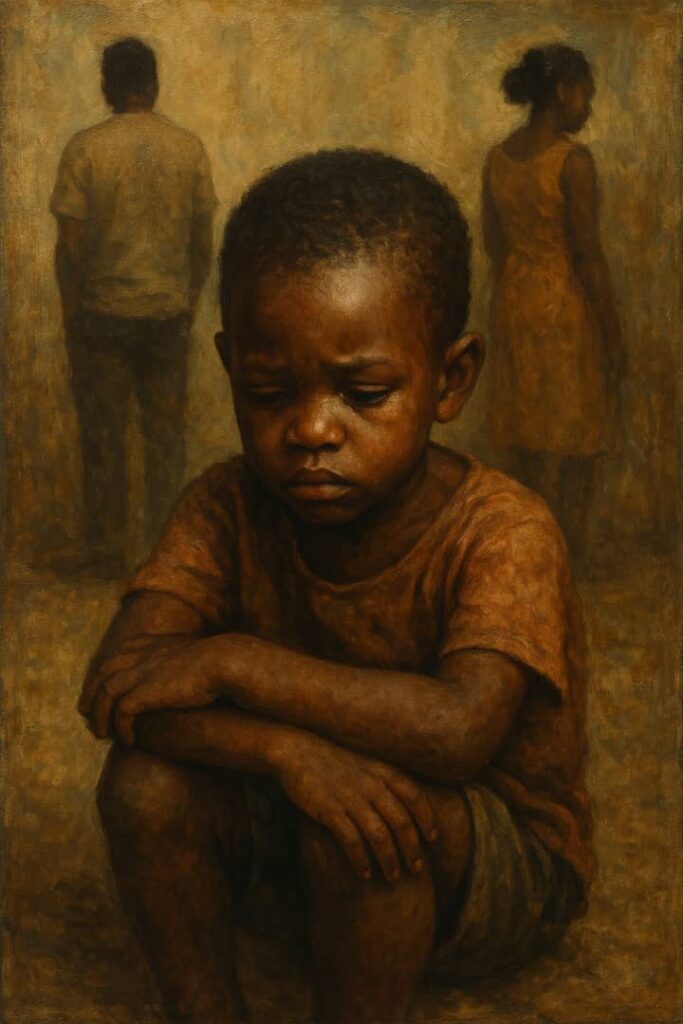By Bonnke Fofanah
Parental negligence—defined as the failure of parents or guardians to provide proper care, attention, and supervision to their children—has a profound and far-reaching impact, not just on the affected children, but on society as a whole. When children are deprived of emotional, physical, or educational support, the consequences can ripple through generations, creating lasting social, economic, and psychological effects.

Emotional and Psychological Impact on Children
To begin with, one of the effects of parental negligence on society is manifested through emotional and psychological impact on children. Through emotional and psychological impact, neglected children often suffer from low self-esteem, trust issues, anxiety, and depression. In the absence of emotional support and guidance, they may struggle to build healthy relationships and to develop coping mechanisms. Over time, these emotional deficiencies can manifest in behavioral problems such as aggression, withdrawal, or delinquency. In my journalistic work, I met a lady in Freetown who is a school dropout, whom I interviewed. She narrated her ordeals and how her parents’ negligence in caring for her led her to dropping out of school. In her words she said, “I wanted to become a medical doctor and impacted my community positively. However, I could not contribute meaningfully to my society because my parents neglected me.” According to her, during her secondary education she could not get access to school supplies, no support with homework or learning at home, frequent absenteeism and above all exposure to unsafe or unmotivating environments. With regards to her well-being, she said her exposure to poor nutrition, inadequate clothing, lack of healthcare and frequent exposure to violence and unsafe living conditions warranted her dropping out of school and hence could not realize her dreams.
Poor Academic and Cognitive Development
Additionally, another effect of parental negligence on society is poor Academic and Cognitive Development. This contributes negatively to academic excellence, hence societal depreciation. Elaborating on this point, children who are not nurtured or encouraged often perform poorly in school. They may have difficulty concentrating, lack motivation, or experience developmental delays. This leads to higher dropout rates, lower skill acquisition, and reduced career prospects, weakening the overall human capital of society. Today, many children punch below their weight academically because their parents have neglected them. Talking with children who dropped out of school within recent times, they revealed to me they could not make progress academically because their parents neglected their education and cognitive development. They explained that during their schooling days, their parents could not provide them with the learning support needed. They were exposed to poor learning materials, little or no support with homework or learning at home, not paying school charges as and when needed, and above all there was no parent-children academic monitoring.

Increased Crime Rates
The rate of crime today has become too difficult to handle. Although the Sierra Leone Police (SLP) has not published specific statistics detailing the percentage of crimes committed by youth between 2023 and 2024, but the knot is that, the manner in which crimes is seen in the country within the recent times is evident to the fact and very appalling.
Considering insights into youth involvement in crime, while specific percentages are unavailable, anecdotal evidence and community reports suggest that youth involvement in certain crimes, particularly petty theft and drug-related offenses, remains a concern. For instance, in areas like Kroo Bay, Brookfields etc. It is a fact that high youth unemployment rates (estimated over 50%) contribute to increased involvement in petty crimes and substance abuse among young people.
Consequently, the prevalence of drugs such as tramadol and Kush (a synthetic drug) has been linked to the rise in youth-related offenses in urban settlements.
Studies have consistently linked parental neglect to juvenile delinquency. Without supervision, values, or discipline, many neglected youths turn to crime, either as a means of survival or as an outlet for their unresolved emotions and trauma. This contributes to higher incarceration rates, public safety concerns, and significant strain on legal and correctional systems.
Perpetuation of the Cycle of Neglect
Neglect is often cyclical. Children who grow up in neglected environments may become negligent parents themselves. Without intervention, this pattern continues, leading to a generational cycle that reinforces poverty, illiteracy, and social dysfunction.
Economic Burden on Society
Neglected children often require additional public services—foster care, special education, mental health services, and legal intervention. These needs represent a significant financial burden on taxpayers and social institutions. Furthermore, the underdevelopment of such individuals often results in lower workforce productivity and increased dependency on welfare systems.
Social Fragmentation and Instability
When large segments of a population are raised in neglectful environments, the result is a weakened social fabric. Trust in institutions erodes, civic engagement declines, and social cohesion breaks down. In extreme cases, this can fuel unrest and widen socioeconomic divides.
Concluding this piece, parental negligence is not a private issue, it is a social concern with wide-ranging implications. Early intervention, parenting education, community support, and strong social policies are crucial to mitigating the effects. Societies that invest in family welfare and child development not only protect their most vulnerable members but also build a stronger, more stable, and more prosperous future for all.
About the Author: Bonnke Fofanah is a journalist who works with the Executive Newspaper in Sierra Leone as a reporter. He holds a B.Sc. in Agricultural Communication and Media from Njala University. As a reporter he enjoys seeking out stories that relate to all walks of life. In his words, one thing he loves about journalism is “the profession shapes my writing skills continuously and put me on the scale of advocating for positive social change.”



Leave a Reply